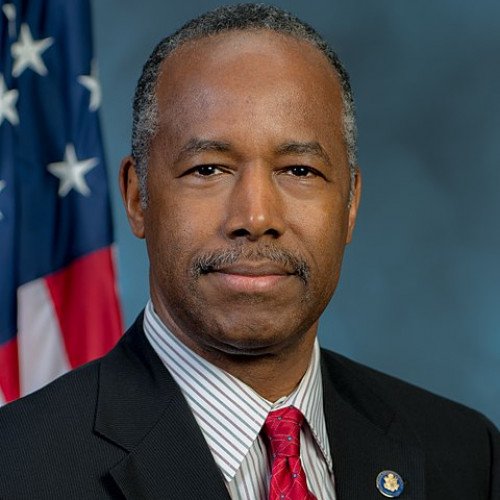Ben Carson VS Barry Goldwater

Ben Carson
Benjamin Solomon Carson Sr. (born September 18, 1951) is an American politician, author, and retired neurosurgeon who served as the 17th United States Secretary of Housing and Urban Development from 2017 to 2021. He was a candidate for President of the United States in the 2016 Republican primaries. He is considered a pioneer in the field of neurosurgery.Carson became the Director of Pediatric Neurosurgery at the Johns Hopkins Children’s Center in 1984 at age 33; he was the youngest chief of pediatric neurosurgery in the United States. At retirement, he was professor of neurosurgery, oncology, plastic surgery, and pediatrics at the Johns Hopkins School of Medicine. Carson's achievements include participating in the first reported separation of conjoined twins joined at the back of the head. Although surgically a success, the twins continued to suffer neurologic/medical complications. Additional accomplishments include performing the first successful neurosurgical procedure on a fetus inside the womb; developing new methods to treat brain-stem tumors; and revitalizing hemispherectomy techniques for controlling seizures. He wrote over 100 neurosurgical publications. He retired from medicine in 2013. Carson gained national fame among political conservatives after delivering a speech at the 2013 National Prayer Breakfast which was perceived as critical of the policies of President Barack Obama. Following widespread speculation of a presidential run, Carson officially announced his campaign for the 2016 Republican nomination for President in May 2015. Carson performed strongly in early polls, leading to him being considered a frontrunner for the nomination during the fall of 2015; however, his polling support began to decline following scrutiny of his foreign policy credentials after the November 2015 Paris attacks. Carson withdrew from the race after Super Tuesday, following a string of disappointing primary results, and endorsed Donald Trump. Following Trump's victory, Trump nominated Carson as Secretary of Housing and Urban Development, being confirmed by the United States Senate in a 58–41 vote on March 2, 2017. Carson has also been seen as a "symbol" of black conservatism.Carson has received numerous honors for his neurosurgery work, including more than 60 honorary doctorate degrees and numerous national merit citations. In 2001, he was named by CNN and TIME magazine as one of the nation's 20 foremost physicians and scientists, and was selected by the Library of Congress as one of 89 "Living Legends" on its 200th anniversary. In 2008, Carson was bestowed the Presidential Medal of Freedom, the highest civilian award in the United States. In 2010, he was elected into the National Academy of Medicine. He was the subject of the 2009 TV film Gifted Hands: The Ben Carson Story, where he was portrayed by Cuba Gooding Jr.
Statistics for this Xoptio

Barry Goldwater
Barry Morris Goldwater (January 2, 1909 – May 29, 1998) was an American politician, businessman, and author who was a five-term Senator from Arizona (1953–1965, 1969–1987) and the Republican Party nominee for president of the United States in 1964. Despite his loss of the 1964 presidential election in a landslide, Goldwater is the politician most often credited with having sparked the resurgence of the American conservative political movement in the 1960s. He also had a substantial impact on the libertarian movement.Goldwater rejected the legacy of the New Deal and, along with the conservative coalition, fought against the New Deal coalition. A member of the NAACP and active supporter of desegregation in Phoenix, Goldwater voted in favor of the Civil Rights Act of 1957 and the 24th Amendment to the U.S. Constitution, but opposed the Civil Rights Act of 1964, believing it to be an overreach by the federal government—a decision that considerably anguished him. In 1964, Goldwater mobilized a large conservative constituency to win the hard-fought Republican presidential primaries. Although raised as an Episcopalian, Goldwater was the first candidate of ethnically Jewish heritage to be nominated for President by a major American party (his father was Jewish). Goldwater's platform ultimately failed to gain the support of the electorate and he lost the 1964 presidential election to incumbent Democrat Lyndon B. Johnson by one of the largest margins in history. Goldwater returned to the Senate in 1969 and specialized in defense and foreign policy. As an elder statesman of the party, Goldwater successfully urged President Richard Nixon to resign in 1974 when evidence of a cover-up in the Watergate scandal became overwhelming and impeachment was imminent. Goldwater narrowly won re-election in 1980 for what would be his final and most influential term in the senate. In 1986, Goldwater oversaw passage of the Goldwater–Nichols Act, arguably his most significant legislative achievement, which strengthened civilian authority in the Department of Defense. The following year, he retired from the Senate and was succeeded by John McCain, who praised his predecessor as the man who "transformed the Republican Party from an Eastern elitist organization to the breeding ground for the election of Ronald Reagan". Goldwater strongly supported the 1980 presidential campaign of Reagan, who had become the standard-bearer of the conservative movement after his "A Time for Choosing" speech. Reagan reflected many of the principles of Goldwater's earlier run in his campaign. The Washington Post columnist George Will took note of this, writing: "We [...] who voted for him in 1964 believe he won, it just took 16 years to count the votes". Goldwater's views grew increasingly libertarian as he neared the end of his career. After leaving the Senate, Goldwater's views cemented as libertarian. He criticized the "moneymaking ventures by fellows like Pat Robertson and others [in the Republican Party] who are trying to... make a religious organization out of it." He lobbied for homosexuals to be able to serve openly in the military, opposed the Clinton administration's plan for health care reform, supported abortion rights, and the legalization of medicinal marijuana.